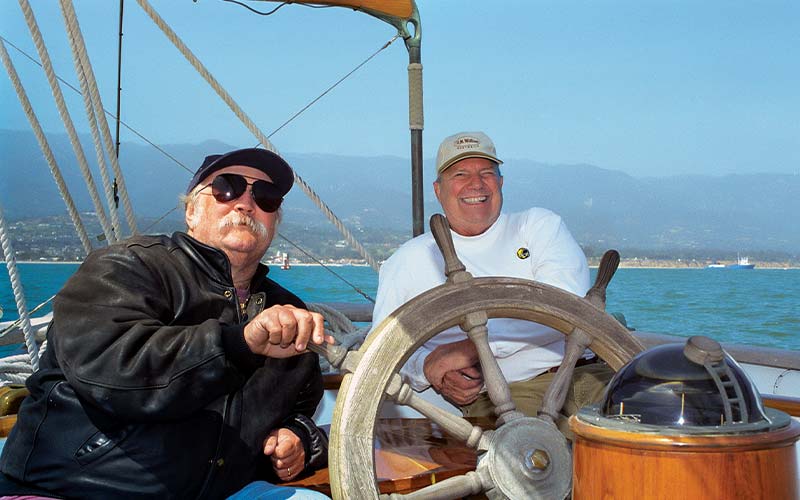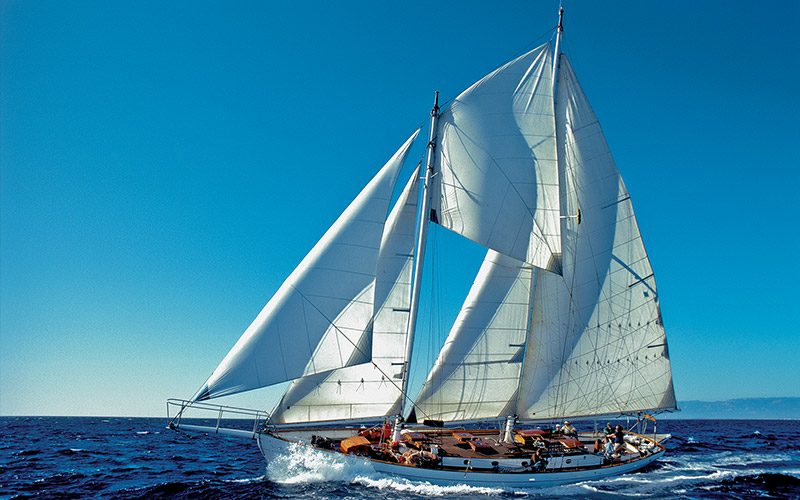Hometown: Santa Ynez, Calif.
Age: 71
Years Diving: 43
Favorite Destination: “Fiji. I love Fiji’s extraordinary water clarity and richly vibrant coral reefs.”
Why I’m a DAN Member: “[Joining DAN] seemed to be the right thing for a diver to do. I like it for the information and education DAN brings.”
For many DAN members, a soundtrack to the most significant times of their lives might very well feature the music of David Crosby. Crosby’s music has been consistently iconic: as a founding member of the Byrds; in collaboration with Stephen Stills, Graham Nash and Neil Young and through a celebrated career as a solo artist.
But this is not a story of his music, which has been well chronicled in decades of Rolling Stone and other magazines; nor is it a story about his epic substance abuse and resulting health issues, which included a liver transplant and a horrific motorcycle accident. Crosby told those stories, candidly and eloquently, in two autobiographies: Long Time Gone and Since Then: How I Survived Everything and Lived to Tell About It. Instead, this is about something he shares with all Alert Diver readers, a love of the ocean and a passion for scuba diving.
It was while reading Since Then that I realized how deep Crosby’s connection to diving must be. Describing his liver disease, he said, “The process was accelerating; my liver was less and less functional. So I came to terms, as much as one can, with the knowledge I might be dead before much longer … my only chance was to get a replacement … the uncertainty is awful.” With that mindset, and fearing an organ donor might not be found in time, Crosby described his immediate priorities, “I decided to go sailing and get in a few last dives.”
Surely, many of us have wondered what we might do if faced with the end of life and perhaps thought it might involve scuba diving. For Crosby in 1994, the decision he made was to take a trip on his beloved 60-foot schooner Mayan with friends and his wife, Jan, to the Channel Islands.
If ever there was someone who needed dive accident insurance, it would be a guy planning to jump into the ocean with a liver so badly diseased that fluid was building in his abdomen and his brain was being poisoned by ammonia. He acknowledged it was a very bad time for him and that his judgment wasn’t particularly good either: “Yeah, that was pretty scary. I just wanted to stay alive long enough to get another dive in, but eventually we put her under full canvas and hauled ass to get to the hospital.” A donor was eventually found, and the liver transplant was successful. Crosby can now look back on those times with the introspection of a survivor.
Today, enjoying a life of sobriety and the company of family and close friends, he still writes and performs. The day we spoke he was packing for a show in San Francisco, preparing to record a new album and getting ready for an upcoming Crosby, Stills and Nash tour of the U.S. and Europe, but he still made time to talk about scuba diving.
AD: Thanks for taking the call. I know you are a DAN member, and we appreciate it.
Crosby: No worries. I get Alert Diver, and I actually read it — great information!
We have a family membership, and my son, Django, is 17 and really passionate about diving. Ed Stetson in Santa Barbara was his scuba instructor, and Django took to it like a duck. He’s a strong swimmer, and with me being 71 and Jan being 60, we love diving together as a family, knowing Django is looking out for us.
I’ve been diving for 43 years, so it’s become second nature to me. I haven’t been certified that long though. At first we just had a compressor on my boat, and I went out diving with experienced friends who taught me enough to keep me out of trouble. You would have laughed at some of our original gear. In the early years of my dive adventures we sailed Mayan to Hawaii and salvaged aluminum sheeting for backplates and held the tanks in place with seatbelts from a junked car. It wasn’t until I wanted to dive off other boats that I realized I had to be certified to get my tanks filled.
One of my best friends is dive-equipment manufacturer Bev Morgan. He is well known in dive circles for developing Kirby Morgan commercial dive helmets among many other things. We met at the marina in Santa Barbara a long time ago, and we have been diving and sailing together forever. After meeting Bev, finding modern gear was never a problem again.

AD: Bret Gilliam quoted Morgan’s recollection of your early years together as follows:“He had this big Alden schooner, and he used it to get away from the crazy side of the music business and concert tours…. I had a lot of underwater camera gear and time to break away to do things. Crosby had a great sailboat set up for diving, enjoyed diving and was a good guy. The boat always also seemed to have a lot of very good-looking girls aboard. Let’s see now: big sailboat, lots of dive gear, lots of camera gear, good food, good music, lots of money and time enough between concerts and work to go anywhere we wanted.”It does sound like a recipe for lifelong memories.
Crosby: It’s true, we’ve had some amazing dive adventures off Mayan. Actually, the waters of my backyard, the Channel Islands off Santa Barbara, have provided some of the best dives I’ve had anywhere. You can get good days with amazing visibility, and when we started diving there were abalone and lobsters everywhere. These days I dive the Channel Islands from my own boat sometimes and from one of Truth Aquatics’ dive boats other times. I love just getting out there.
I’ll take almost any excuse to get in the water. The ocean is real. It is welcoming if you respect it, and it’s a great teacher. It can punish you if you underestimate it, but the time I’ve spent underwater is the most purely satisfying time I’ve spent in life. The more time a person spends in contact with the ocean, the more complete that person will become.
AD: If you had to pick one song from your catalog to represent your love of the sea, which would you choose?
Crosby: Graham Nash wrote a beautiful song called “To The Last Whale” that we first recorded in 1975 on our Wind on the Water duet album. I wrote a harmony called “Critical Mass” to be played at the front end of that song, and it came to the attention of the Cousteau Society. They graciously provided footage of whales and dolphins to be projected on a massive screen when we played live, and we did a Crosby, Stills and Nash tour with those visuals synched with our music. As a pure homage to the great whales and a symbol of respect for the ocean’s inhabitants, that’s probably my favorite.

AD: It seems like some of your famous peers are likewise passionate about the sea and ocean conservation. Jackson Browne and Neil Young are both members of the Ocean Elders, for example. Is it a musician thing?
Crosby: I don’t know that it’s a musician thing. Neil loves to sail, and Jackson is a surfer, so they both really relate to the sea and naturally want to influence its preservation if they can. I’m the same way. Remember, I grew up in Santa Barbara as a kid, and I would spend all day, every day at the beach. I was sailing that water by the time I was 11, and now, 60 years later, I’m still at it — either sailing on it or diving under it.
You can’t be around the ocean and not notice things are changing. Drift nets are a horror show … 30 miles of line that kills anything that swims in its path. Global warming and ocean acidification are massive challenges to the sea — and to mankind for that matter. I find diving to be the most peaceful thing I do in life, but as divers we need to be fighters. The ocean is so elevating to my spirit that I am willing to fight for it.
I feel we, collectively, can work against global warming, underwater tests of nuclear weapons and the sheer mass of plastic and Styrofoam in our lives. People can make a difference. An example that immediately comes to mind is Louie Psihoyos and Ric O’Barry educating the world about a culture of dolphin hunting in Japan when they made The Cove. Those kinds of messages deeply resonate.
Thankfully, there are still amazing things to see. When I descend onto the reef I’m inspired all over again. We all want to save and nourish and protect the sea, and if in some small way I can contribute to the greater good, I’ll be there.
© Alert Diver — Q2 Spring 2013